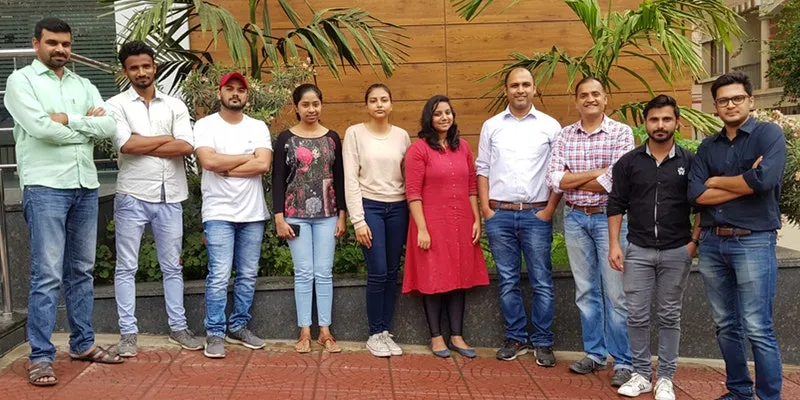Bengaluru enterprise SaaS startup Zoapi claims to set up conference rooms in just 30 seconds
Meeting room collaboration platform Zoapi’s product has been used over 12,000 meetings and for nearly 9,000 hours, in the first 10 months of starting its operations. The startup’s client list includes Inmobi, WeWork, RedBus, Chiratae Ventures, and Raymonds, among others.
Across the world, companies, big and small, face one recurring challenge – setting up a meeting room. While employees may complain that several discussions held during a meeting could easily have been conveyed over emails, one can never downplay the importance of face-to-face work huddles.
Bengaluru-based Zoapi came to be when its founders realised how setting up software decks for a conference room and arranging Skype or Zoom calls often take more time than the meeting itself, thus hampering the productivity of employees.
Vinay MK, during his MBA days at IIM Bangalore, was intrigued by the huge delay caused during one of his classes. “IIMB classes always had technical IT team available round-the-clock just to ensure that the display and AV systems worked fine,” Vinay, 43, says.
Years later, in 2018, Vinay discussed this problem with Chaitanya Vasantarao and Prashant NS, his colleagues at PathPartner Technologies.

Team Zoapi
A meeting room solution
That’s when they ideated meeting room solution – Zoapi. The enterprise Saas solution combines four basic needs of a meeting room: wireless screen sharing, video conferencing, online calendar, and room schedular. The startup claims to be able to pull up any screen on television within 30 seconds.
Starting operations in Bengaluru, in January 2019, Zoapi is a member of Intel IoT Solution alliance. It has also partnered with Logitech and NewLine touchscreens.
“Whenever a programmer needs to solve a problem, they search for open source API hooks to solve it. With meeting room problems, we just need a zero overhead API (or ZOAPI), for every one to use in meet ” says Vinay.
Vinay has done his master’s at IIT Kanpur. Currently the CEO at Zoapi, Vinay is also the Co-founder of PathPartner Technologies. Vinay manages Zoapi’s partnerships, public relations, and strategy.
CTO Chaitanya, 36, is a wireless screen sharing expert and the brain behind the product protocol stack. Having worked as a software engineer since 2004, Chaitanya was a key architect of a custom screen sharing stack.
Prashant, 31, is the data guy. He has previously worked on state-of-the-art encoders and had filed patents at making them better. He is the CBO, controlling marketing and server algorithms for report generations.
The trio were colleagues at PathPartner Technologies and have known each other for more than 12 years now. Besides them, Zoapi has four developers, two testers, and four sales and marketing guys.
Zoapi Hub
The startup’s main product, Zoapi Hub, includes wireless screen sharing, video conferencing app suite, online calendar integrations, room scheduler application (for Android tablets), the zTap app for touchscreen tabletop, and online dashboard for remote configurations of devices. Up to 16 screens can be shared at a time.
Currently, it is available under two plans –Lite, priced at Rs 700 per room per month, can also be bought at a one-time license fee of $449. The premium version is available at Rs 1,000 per month per room. It offers custom pricing for enterprises.
Anyone can buy the enterprise software online. It is also available as a pre-installed device (on Intel Mini-PCs) with one-time Lite plan pan-India, through AV system integrators.
Zoapi targets any organisation with a meeting room. Having said that, its main target customers include coworking spaces and enterprises.
“Banks and financial institutions have lots of meeting rooms. Zoapi is an ideal product for such companies for its security and SaaS structure,” says Vinay.
Zoapi has most of its customers based out of Bengaluru and Mumbai. Coworking space Kafnu was Zoapi’s first customer.
Besides that, IDFC in Mumbai has bought a licence to pilot a test run. HPE has bought more than 15 pre-installed devices through Zoapi’s partner Translabs. According to Vinay, InMobi, WeWork, and Raymonds have been Zoapi’s repeat customers.
“Having Zoapi Hub in boardrooms is equivalent to putting up a hoarding on MG Road (commercial area in Bengaluru) and getting paid for it as well,” jokes Vinay.
Growing numbers
Starting commercial operations at the beginning of this year, Zoapi has sold over 144 licences till now, of which 20 companies are from outside India.
Initially bootstrapped with up to Rs 3 crore from the founders, Zoapi has been seed-funded and incubated by a tech company in Bengaluru.
“We are in talks with five different VCs and hope to receive an initial investment of Rs 5 crore,” Vinay adds.
According to the founders, 40 percent of its deals come from repeat customers. On an average, Zoapi’s monthly revenue growth has been almost 15 percent. “In India, we have a one-time Lite plan sold as part of pre-installed devices and our existing customers are using premium features that was offered for free for the first six months,” says Vinay.
Within the first 10 months of starting up, Zoapi has clocked Rs 50 lakh in revenue. They are targeting to close the calendar year by achieving Rs 75 lakh in revenue.
Market overview and future plans
According to a report by FutureSource Consulting, published on May 2018, 20 percent of meeting room budgets are now being spent on collaborative technologies. However, out of the 50 million huddle rooms that are available in the market, less than two percent of them have any digital technology.
“Potential to grow for meeting room collaboration technology which matches the right price point is very high,” says Vinay.
Barco Clickshare is a global leader for meeting collaboration products. Other notable products in the market are Mersive Solistice, Kramer VIA campus, Harman AMX, Airtame and Prijector. However, what sets Zoapi apart is its ‘enterprise software as a service’ model.
“While all others need custom hardware, Zoapi can be installed on off-the-shelf, cost-effective Intel hardware, with flexible plans. It converts the otherwise capex expenditure to opex,” says Vinay.
Zoapi is looking to raise funds now. According to the founders, a couple of HNI customers have shown interest to participate in its next round of funding. Zoapi also has plans to enter the education space. The startup has developed a smart attendance app, which it plans to launch by March, 2020.
Edited by Evelyn Ratnakumar









